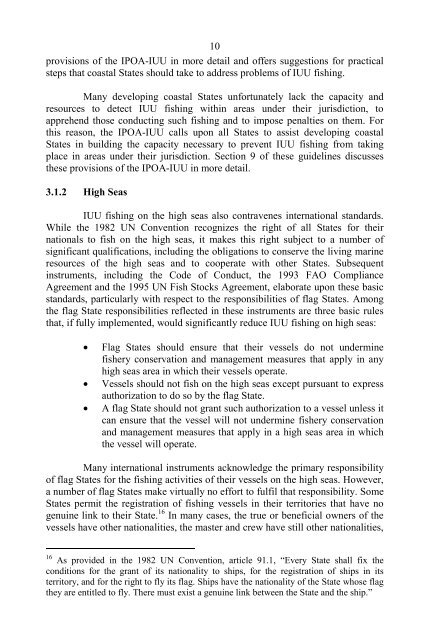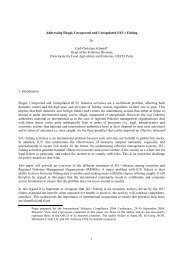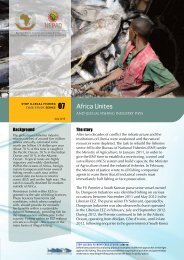Implementation of IPOA/IUU - International MCS Network
Implementation of IPOA/IUU - International MCS Network
Implementation of IPOA/IUU - International MCS Network
You also want an ePaper? Increase the reach of your titles
YUMPU automatically turns print PDFs into web optimized ePapers that Google loves.
10provisions <strong>of</strong> the <strong>IPOA</strong>-<strong>IUU</strong> in more detail and <strong>of</strong>fers suggestions for practicalsteps that coastal States should take to address problems <strong>of</strong> <strong>IUU</strong> fishing.Many developing coastal States unfortunately lack the capacity andresources to detect <strong>IUU</strong> fishing within areas under their jurisdiction, toapprehend those conducting such fishing and to impose penalties on them. Forthis reason, the <strong>IPOA</strong>-<strong>IUU</strong> calls upon all States to assist developing coastalStates in building the capacity necessary to prevent <strong>IUU</strong> fishing from takingplace in areas under their jurisdiction. Section 9 <strong>of</strong> these guidelines discussesthese provisions <strong>of</strong> the <strong>IPOA</strong>-<strong>IUU</strong> in more detail.3.1.2 High Seas<strong>IUU</strong> fishing on the high seas also contravenes international standards.While the 1982 UN Convention recognizes the right <strong>of</strong> all States for theirnationals to fish on the high seas, it makes this right subject to a number <strong>of</strong>significant qualifications, including the obligations to conserve the living marineresources <strong>of</strong> the high seas and to cooperate with other States. Subsequentinstruments, including the Code <strong>of</strong> Conduct, the 1993 FAO ComplianceAgreement and the 1995 UN Fish Stocks Agreement, elaborate upon these basicstandards, particularly with respect to the responsibilities <strong>of</strong> flag States. Amongthe flag State responsibilities reflected in these instruments are three basic rulesthat, if fully implemented, would significantly reduce <strong>IUU</strong> fishing on high seas:Flag States should ensure that their vessels do not underminefishery conservation and management measures that apply in anyhigh seas area in which their vessels operate.Vessels should not fish on the high seas except pursuant to expressauthorization to do so by the flag State.A flag State should not grant such authorization to a vessel unless itcan ensure that the vessel will not undermine fishery conservationand management measures that apply in a high seas area in whichthe vessel will operate.Many international instruments acknowledge the primary responsibility<strong>of</strong> flag States for the fishing activities <strong>of</strong> their vessels on the high seas. However,a number <strong>of</strong> flag States make virtually no effort to fulfil that responsibility. SomeStates permit the registration <strong>of</strong> fishing vessels in their territories that have nogenuine link to their State. 16 In many cases, the true or beneficial owners <strong>of</strong> thevessels have other nationalities, the master and crew have still other nationalities,16 As provided in the 1982 UN Convention, article 91.1, “Every State shall fix theconditions for the grant <strong>of</strong> its nationality to ships, for the registration <strong>of</strong> ships in itsterritory, and for the right to fly its flag. Ships have the nationality <strong>of</strong> the State whose flagthey are entitled to fly. There must exist a genuine link between the State and the ship.”
















